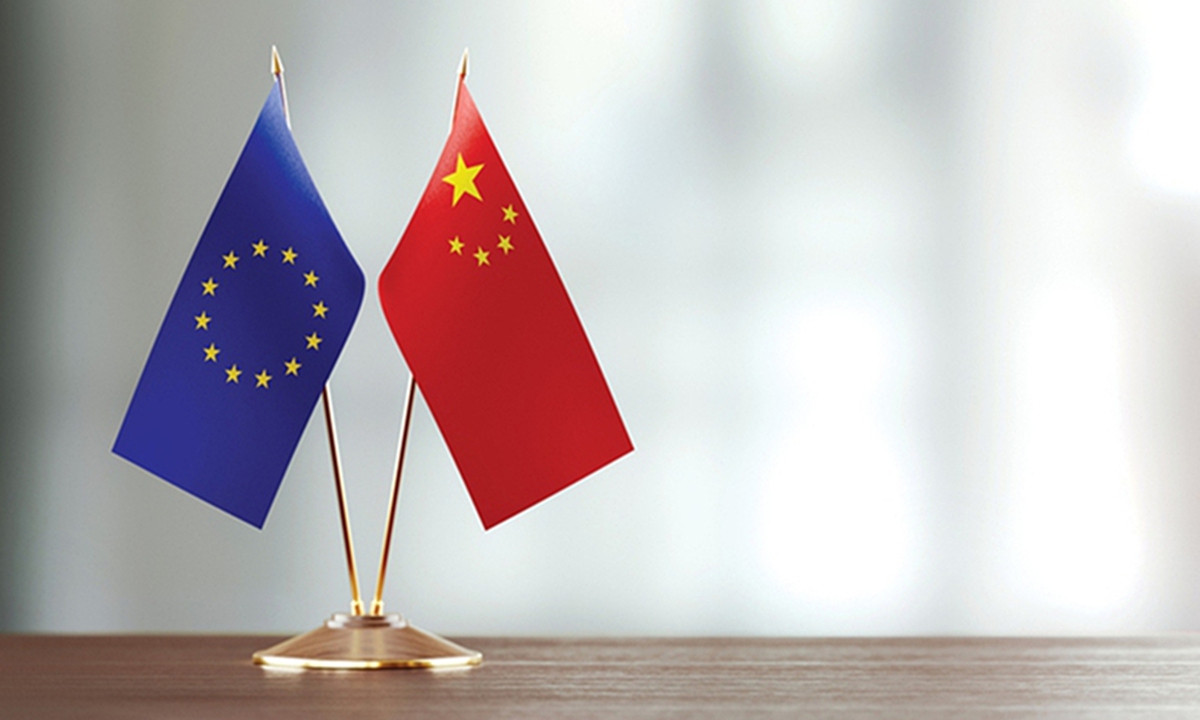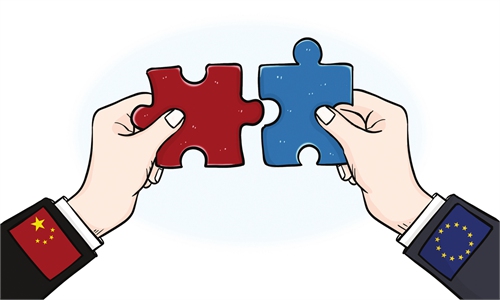China, EU hold ‘productive’ trade dialogue; bloc urged to take concrete steps to stop protectionism

China-EU Photo: VCG
Chinese and EU officials on Monday held a high-level economic and trade dialogue in person in Beijing for the first time since the COVID-19 pandemic, saying that they had held "in-depth, candid and productive" talks and reached a series of new win-win results and consensus in various areas, including setting up a communication mechanism for export controls.
The successful holding of the 10th China-EU High-level Economic and Trade Dialogue and the relatively constructive tone following the meeting send a positive signal for the world that amid a severe global economic downturn and a series of other challenges, two of the world's biggest economies are trying to manage their differences and boost cooperation, Chinese experts noted.
However, major differences and challenges remain, as the EU side has taken a series of policy measures in recent months under its so-called "de-risking" campaign, which have been widely viewed as targeting China and Chinese businesses. While the EU side continues to claim that it is not seeking to decouple from China and make accusations against China's market, it is Brussels that needs to take real actions to stop its rising protectionism, experts said.
Constructive talks
On Monday afternoon, Chinese Vice Premier He Lifeng and Executive Vice President of the European Commission and Trade Commissioner Valdis Dombrovskis co-chaired the 10th High-level Economic and Trade Dialogue at the Diaoyutai State Guesthouse in downtown Beijing. The dialogue is the highest level of its kind in which the two sides addressed economic and trade issues and one of the "three pillars" of China-EU ties. This year's meeting resumed the in-person format for the first time since the pandemic.
After the talks, the two officials held a press conference on Monday night. He said that the two sides held "in-depth, candid and productive" talks on four topics - the macro economy, trade and investment, industrial and supply chains and financial cooperation. The two sides also reached a series of new win-win results and consensus in six areas, including strengthening macro policy coordination, jointly preserving the WTO-centered multilateral trade system and opposing unilateralism and protectionism, and jointly safeguarding the stability of industrial and supply chains. Specifically, the two sides will set up a dialogue mechanism for export controls.
The relatively positive tone underscored the fact that China and the EU remain committed to strengthening bilateral cooperation, despite disputes and tension in some areas, businesses and experts noted.
Fang Dongkui, secretary-general of the China Chamber of Commerce to the EU, told the Global Times on Monday that the in-person talks are conducive for the two sides to expand China-EU economic and trade cooperation and reduce the "deficit in mutual trust," which will lift the confidence of Chinese and EU business communities.
"Holding in-person talks is a positive thing, and is better than holding virtual talks," Chen Fengying, a research fellow at China Institutes of Contemporary International Relations, told the Global Times on Monday, noting that while it remains to be seen whether such talks will result in concrete changes, similar meetings between Chinese and US officials have resulted in the establishment of economic and financial working groups.
After a series of high-level meetings and visits to China by senior US officials, China and the US announced on Friday the establishment of two working groups for economic and financial matters in a major step that experts say could help put the brakes on a downward spiral in bilateral ties.
Chinese and EU officials have also in recent months been stepping up exchanges. In June, Chinese Premier Li Qiang visited Germany and France, where he rejected the rhetoric of "de-risking" and stressed win-win cooperation. Earlier this month, on the sidelines of the G20 summit in India, Li met with top EU officials, stressing that China's development is an opportunity, not a risk, for Europe.
Many EU officials have also visited or are planning to visit China this year, including a high-stakes visit by French President Emmanuel Macron in April. Last week, Chinese Vice Premier Zhang Guoqing and European Commission Vice President Vera Jourova co-chaired the second China-EU high-level dialogue in the digital area in Beijing, where the two sides focused on broad common interests and strong complementarity in the digital field. After Dombrovskis, EU's energy commissioner Kadri Simson is set to visit China next week and top diplomat Josep Borrell next month, the South China Morning Post reported.
Before the dialogue in Beijing, Dombrovskis also visited Shanghai and attended events both there and in Beijing. In a speech at the Tsinghua University in Beijing on Monday, the EU trade chief said that the EU is not seeking to de-couple from China, but to reduce economic dependencies and de-risk, according to Reuters. Dombrovskis has also complained about "unbalanced trade" with China and repeated the long-standing grievances held by some EU business groups in China about its business environment.
A spokesperson for the European Union Chamber of Commerce in China told the Global Times on Monday that "the Chamber expects that long-standing issues including a lack of a level playing field in China and the politicisation of the business environment can be addressed."
Such claims pushed by the EU have become cliché, as "they have been raising similar issues at every dialogue for the past 10 years," Cui Hongjian, professor with the Academy of Regional and Global Governance with Beijing Foreign Studies University, told the Global Times on Monday.
Chinese officials and experts have repeatedly refuted such accusations against China's business environment and stressed that it is the EU's growing protectionist actions under the guise of "de-risking" that are posing profound risks and challenges for business cooperation.
EU protectionism
During the talks on Monday, the Chinese side once again expressed great concern and strong dissatisfaction with the EU's anti-subsidy investigation into Chinese electric vehicles (EVs). The Chinese side also said that China is willing to expand imports from the EU, but hoped that the EU will lift restrictions on high-tech exports to China.
Asked about the dialogue and the EU's anti-subsidy probe into Chinese EVs at a regular press briefing on Monday, Mao Ning, a spokesperson for the Chinese Foreign Ministry, said that China opposes all forms of trade protectionism and the relevant actions of the EU are not conducive to the stability of the global auto industry and supply chains and are not in anyone's interests. Mao urged the EU to create a fair, non-discriminatory and predictable market environment for the common development of the Chinese and European electric vehicle industries and jointly oppose trade protectionism.
Cui pointed out that from the Chinese perspective, the EU has in recent years taken a slew of measures in the areas of investment, trade and industries that are of a protectionist nature. "All these issues urgently need to be addressed… the EU side cannot adopt an attitude of blaming China for all the problems," he said.
The investigation into Chinese EVs is hardly the only protectionist move taken by the EU. Last week, the EU's European Chips Act officially went into force, which entails massive subsidies to bolster the EU's chip industry. In June, it launched the European Economic Security Strategy, essentially a step to "de-risk," and claimed that Chinese 5G suppliers Huawei and ZTE pose "materially higher risks than other 5G suppliers." Under such rhetoric, some EU countries are reportedly taking steps to exclude Huawei and ZTE, with the latest being Germany, which drew a harsh response from China and even the German business community.
Experts said that such steps, including the latest probe into Chinese EVs, are not just attempts to increase the EU's leverage during talks, but are also aimed at systemically cutting so-called "dependencies" on China due to geopolitical and ideological biases. Furthermore, despite all their protectionist moves, EU officials have repeatedly claimed that they are not seeking to "decouple" from China; however, for China, the EU must demonstrate its intention with real actions not rhetoric, experts added.
Fang also urged the EU to clarify these moves and seek positive consultations and proper solutions with the Chinese side. The EU should "not easily resort to trade and policy tools that overstretch the concept of national security and politicize economic and trade issues," Fang said.
"If the EU wants to prove that it is de-risking and not decoupling, the burden of proof falls squarely on the EU side," Bai Ming, a research fellow at the Chinese Academy of International Trade and Economic Cooperation under the MOFCOM, told the Global Times on Friday, stressing that the "unbalanced trade" is due to the EU's own policies, not China's.


